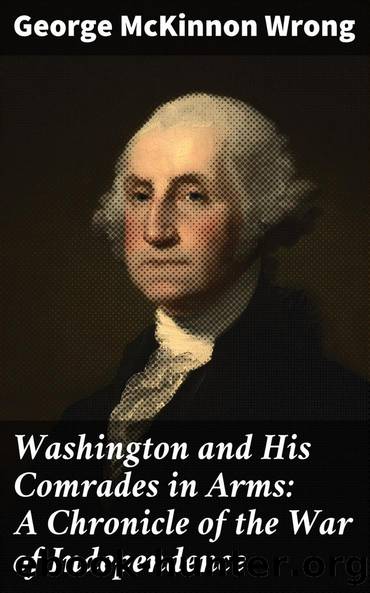Washington and His Comrades in Arms: A Chronicle of the War of Independence by George McKinnon Wrong Allen Johnson

Author:George McKinnon Wrong, Allen Johnson [George McKinnon Wrong, Allen Johnson]
Language: eng
Format: epub
Tags: Nonfiction, Religion & Spirituality, New Age, History, Fiction & Literature
ISBN: 9781465553744
Google: LMk7vgEACAAJ
Publisher: Library of Alexandria
Published: 2021-02-24T05:00:00+00:00
* * *
Washington's winter quarters at Valley Forge were only twenty miles from Philadelphia, among hills easily defended. It is matter for wonder that Howe, with an army well equipped, did not make some attempt to destroy the army of Washington which passed the winter so near and in acute distress. The Pennsylvania Loyalists, with dark days soon to come, were bitter at Howe's inactivity, full of tragic meaning for themselves. He said that he could achieve nothing permanent by attack. It may be so; but it is a sound principle in warfare to destroy the enemy when this is possible. There was a time when in Washington's whole force not more than two thousand men were in a condition to fight. Congress was responsible for the needs of the army but was now, in sordid inefficiency, cooped up in the little town of York, eighty miles west of Valley Forge, to which it had fled. There was as yet no real federal union. The seat of authority was in the State Governments, and we need not wonder that, with the passing of the first burst of devotion which united the colonies in a common cause, Congress declined rapidly in public esteem. What a lot of damned scoundrels we had in that second Congress said, at a later date, Gouverneur Morris of Philadelphia to John Jay of New York, and Jay answered gravely, Yes, we had. The body, so despised in the retrospect, had no real executive government, no organized departments. Already before Independence was proclaimed there had been talk of a permanent union, but the members of Congress had shown no sense of urgency, and it was not until November 15, 1777, when the British were in Philadelphia and Congress was in exile at York, that Articles of Confederation were adopted. By the following midsummer many of the States had ratified these articles, but Maryland, the last to assent, did not accept the new union until 1781, so that Congress continued to act for the States without constitutional sanction during the greater part of the war.
The ineptitude of Congress is explained when we recall that it was a revolutionary body which indeed controlled foreign affairs and the issues of war and peace, coined money, and put forth paper money but had no general powers. Each State had but one vote, and thus a small and sparsely settled State counted for as much as populous Massachusetts or Virginia. The Congress must deal with each State only as a unit; it could not coerce a State; and it had no authority to tax or to coerce individuals. The utmost it could do was to appeal to good feeling, and when a State felt that it had a grievance such an appeal was likely to meet with a flaming retort.
Washington maintained towards Congress an attitude of deference and courtesy which it did not always deserve. The ablest men in the individual States held aloof from Congress. They felt that they had more dignity and power if they sat in their own legislatures.
Download
This site does not store any files on its server. We only index and link to content provided by other sites. Please contact the content providers to delete copyright contents if any and email us, we'll remove relevant links or contents immediately.
| Americas | African Americans |
| Civil War | Colonial Period |
| Immigrants | Revolution & Founding |
| State & Local |
In Cold Blood by Truman Capote(3366)
The Innovators: How a Group of Hackers, Geniuses, and Geeks Created the Digital Revolution by Walter Isaacson(3111)
Steve Jobs by Walter Isaacson(2879)
All the President's Men by Carl Bernstein & Bob Woodward(2357)
Lonely Planet New York City by Lonely Planet(2204)
And the Band Played On by Randy Shilts(2180)
The Room Where It Happened by John Bolton;(2141)
The Poisoner's Handbook by Deborah Blum(2123)
The Innovators by Walter Isaacson(2088)
The Murder of Marilyn Monroe by Jay Margolis(2085)
Lincoln by David Herbert Donald(1977)
A Colony in a Nation by Chris Hayes(1912)
Being George Washington by Beck Glenn(1872)
Under the Banner of Heaven: A Story of Violent Faith by Jon Krakauer(1784)
Amelia Earhart by Doris L. Rich(1680)
The Unsettlers by Mark Sundeen(1675)
Dirt by Bill Buford(1661)
Birdmen by Lawrence Goldstone(1652)
Zeitoun by Dave Eggers(1630)
